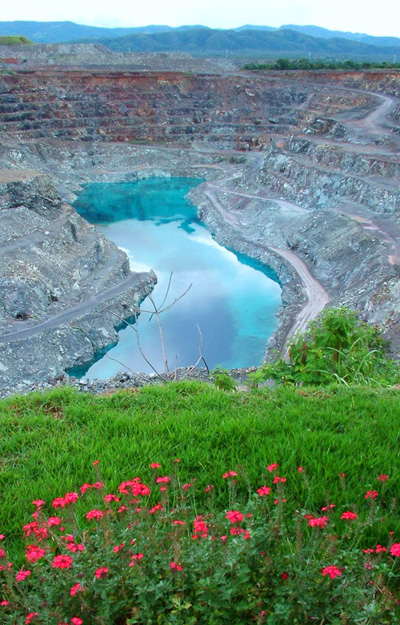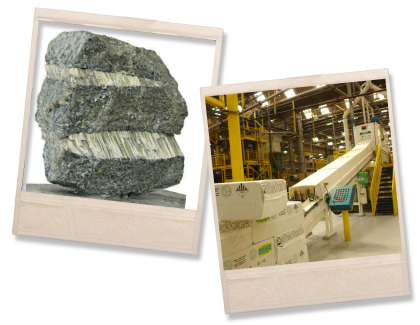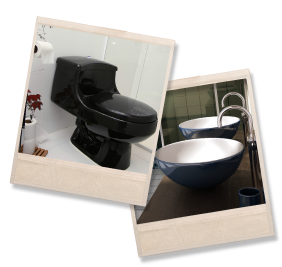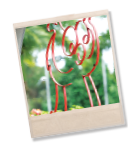
Operational Segments 2.2
Eternit has the principal objective of becoming the most diversified construction materials manufacturers in Brazil and to this end it has been implementing its Structured Plan for Expansion and Diversification (for more on this subject see chapter entitled Floor-to-ceiling over the next 70 years). Currently, its operations include the extraction and sale of chrysotile mineral, the production of fiber - cement tiles (with and without chrysotile asbestos), concrete tiles, which includes a line of accessories, of components for construction systems (panels, cement slabs, and shapes for creating metal frameworks for roofs) and polyethylene water tanks, in addition to the retailing of all its product lines.
Eternit does not sell services, but offers its clients, consumers and specifiers options for training in the construction field, as well as systems and tools that facilitate the day-to-day activities of those who work in the sector. Etercalc, for example, is a tool that is available on the company website, (www.eternit.com.br) which based on the square area of the roof, can execute complex calculations of the quantity of materials and complementary items needed, and provides a simulation of the final result.
Mining
One of Eternit’s main raw materials is chrysotile asbestos, a natural fiber found in the soil and in water. This mineral has various characteristics, such as being incombustible, resilient, durable, flexible, as well as having insulation properties, all of which mean that it offers excellent value for money in its application. This group of minerals – which includes chrysotile asbestos and another type of asbestos known as amphibole – began to be studied in the 20th century, because of their use, when not controlled, can cause diseases (see more on Risk Management).
In Brazil, Eternit extracts and processes chrysotile asbestos through its subsidiary SAMA, under rigid safety standards and with the most up to date technology in the world. The handling of the material in the fiber-cement plants of the Company is done on an automated basis, with the application of all the appropriate safety procedures. This business activity is regulated by Federal Law No. 9.055/95, Decree No. 2.350/97 and the regulatory standards of the Ministry for Labor and Employment.
The mine has been operating since 1967 and has an estimated useful life of over 30 years, depending on production levels. Annually it handles some 5 million tons of chrysotile mineral and 11 million tons of sterile tailings (see extraction and processing flow). This latter is for the most part deposited in the form of tailing mounds to be subsequently covered with soil and native vegetation. A small proportion of this material goes to the Sambaíba Project, which makes arts and crafts items (see more on Community).
Highlights and differentials of SAMA
- Size: the only chrysotile mining company in Latin America and the third largest in the world, with a global market share of 15%, behind only Russia and China.
- Location: Minaçu, in the north of Goiás
- Area occupied: 4500 hectares, of which 20% is used for mining, 10% for reforestation areas and 70% consisting of a natural reserve of native vegetation.
- Certifications: ISO 14001 (Environmental Management) and OHSAS 18001 (Occupational Health and Safety) from DNV Veritas, Norway.
- Commitments and pacts: Global Compact and Millennium Targets of the United Nations Organisation, (UN).
- Local development: one of the largest players of ICMS tax in the state of Goiás, which helps to drive the local economy in the region.
- Employees: 695 in 2012. Of these, 300 reside in the housing estate belonging to the mine, which is built in an area of 893,955.83 square meters beside the Cana Brava nature reserve, providing houses, leisure infrastructure (club, swimming pool, gym and open squares) and facilities (pharmacy and supermarket).
- Recognitions and awards: Best mining company to work for in Brazil, elected by Você S/A magazine.
- Production: running at full capacity since the second quarter of 2007, production amounted to 304,400 tons in 2012.
- Sales: Priority given to the domestic market, as it is more profitable. Exports accounted for 50% of sales volume in 2012.
- Differentials: excellence in environmental, social and health and safety management; consistent level of quality in fiber produced; customer delivery guaranteed within the specified time in any part of the continent.
EXTRACTION AND PROCESSING OF CHRYSOTILE MINERAL
THE EXTRACTION AND LOADING PROCESSES ARE CARRIED OUT UNDER CONSTANTLY DAMP CONDITIONS TO PREVENT PARTICLE EMISSION INTO THE ATMOSPHERE. Plan for mining and production: defines the locations for inroads to be made within the mine for the short, medium and long-term, anticipating changes related to market demand, production scale, vehicle fleet and equipment, as well as geological and climactic conditions in the region. Drilling and blasting: drilling of the rock is carried out by machines that have the capacity to drill holes 5.5 inches in diameter and 15 meters deep. In these holes is packed an emulsion based on ammonium nitrate, prepared at the location and exploded using accessories (boosters and detonators). The fragments removed must be the size appropriate for transport. Loading and transport: the ore and sterile rock is loaded by mechanical diggers into trucks with an individual capacity of 25 to 32 tons. From there they are taken to the primary crusher.  |
ALL THE PROCESSES FROM CRUSHING TO PACKAGING ARE FULLY AUTOMATED AND ENCLOSED, TO PREVENT PARTICLE EMISSION INTO THE ATMOSPHERE. Crushing, concentrating and drying: all the material is fragmented, sieved and separated. This is when the mineral is separated from the sterile rock. The former is enriched, becoming mineral in a concentrated form, and dried in furnaces so as to reach a humidity of less than 5%. Meanwhile the sterile rock is separated and transported by truck to the tailing piles for subsequent environmental revitalization. Dry ore silo: at this location, the concentrated dried ore is maintained in a secure manner until it is sent to the treatment plant. Treating and classification: the ore concentrate undergoes further stages of sieving, separation by blowing and impactation, in order to separate out the chrysotile fiber, which then passes through a circuit of cleaning with sand and fine gravel. Subsequently, the fiber is classified by size, stored in silos, and sample tested to ensure quality control. Packaging: the fiber is compacted into 50 kg bags made from polypropylene and polyethylene. Being totally impermeable, these bags preserve the humidity of the fiber and prevented it from escaping. Having been identified and labelled, the bags are stacked onto pallets and covered with a removable plastic film. This entire process is automated, providing greater safety for employees.
Distribution logistics: every day, around 35 trucks with an individual load capacity of 38 tons drive out of the mining company. For customers in Latin America, mainly highway and railway transport is used. Exports to other continents are shipped out through the ports of Santos (SP), Paranaguá (PR) and Rio de Janeiro (RJ). |
asas
Fiber-cementEvery year, more than 2 million tons of chrysotile fiber is consumed throughout the world, 99% of its application being for the building sector, used principally in the fiber-cement industry. The qualities inherent in chrysotile asbestos applied to fiber-cement products mean that they last for more than 70 years, without damage, according to studies from the São Paulo University Polytechnic School. Eternit, a traditional manufacturer of fiber-cement products has a 32% share of this market. Production is carried out at its four plants and that belonging to its subsidiary Precon Goiás. Eternit also has expertise in the manufacture of fiber-cement products without the use of chrysotile asbestos. The Company has been manufacturing parts for construction systems and tiles with this technology, since 2000 and 2009 respectively, with a view to supplying markets where the sale of asbestos fiber is banned, principally to serve those clients that require these products. The Company’s entire industrial park is being prepared for this type of manufacturing process, which is similar to that used for chrysotile asbestos, merely altering the procedures for the refining of the pulp fiber. |
32%
market share ETERNIT’S DIFFERENTIALS OVER A PERIOD OF 72 YEARS THE COMPANY HAS BUILT A SOLID IMAGE AND HAS DEVELOPED A RANGE OF COMPETITIVE ADVANTAGES: BRAND-NAME STRENGTH, EXTENSIVE DISTRIBUTION CHANNELS, THE STRATEGIC LOCATION OF ITS PLANTS, AND THE CAPACITY TO INVEST. |
FIBER-CEMENT TILE MANUFACTURING PROCESS Cement and lime: these are purchased for each unit from at least two different suppliers to avoid any supply interruptions, with these materials being stocked in automated silos. A pressurised system sends the appropriate quantity of cement and lime for the production of fiber-cement paste. Chrysotile mineral: this is received in compacted chrysotile asbestos bags, which are opened, shredded and shaken in an automated manner in an enclosed environment. In accordance with Eternit’s safety practices, there is no human contact involved in this process. Pulp: obtained from recycled newspapers acquired from cooperatives and empty cement sacks collected from construction firms, this pulp is stored in specific silos and goes through an agitation and weighing process before the production of the fiber-cement. Water: needed for the production of the fiber-cement, this is obtained from artesian wells and rain water catchment. Water used for human consumption at the installation is stored separately from that used in the manufacturing process. |
Preparation of the paste: cement, lime, chrysotile asbestos, recycled pulp and water are mixed together in the correct proportion by a piece of equipment known as the felting machine. The fiber-cement paste takes the form of a membrane after having been compacted by a cylindrical roller. Production: for the production of roofing panels, the fiber-cement membrane is cut into standard sizes and corrugated to obtain the desired shape.
|
CONCRETE TILE
PRODUCTION PROCESS
Production of the cement mix: cement, sand, water and pigments are stored and weighed separately. The sand is sieved, and subsequently mixed with the other raw materials. The resulting mix is sent in an automated manner to the extrusion process.
Extrusion and separation: using a specific piece of equipment, the cement paste is forced through an extrusion process so acquiring the desired tile format. The units are then separated for the finalization stage.
Finishing: the tiles receive an application of varnish and go to the curing chamber, where they remain for around eight hours. The products are then stacked on pallets in the stockyard to be examined by quality control, and only then are they able to be sold.
Manufacture of concrete tiles
Production of concrete tiles were started in Europe in the 19th century, a few decades after the development of Portland cement. This technology only arrived in Brazil in the 70s. Being totally automated, the concrete tile production process permits a variety of shapes, finishes and colours.
Subsidiary Tégula has around 30% of the Brazilian market, concrete tiles and also sells a line of tiling accessories – such as flashing, water tanks, sub-roofing membranes etc. – solar heating systems for bathrooms, all of which make up a complete roofing portfolio. Since 2001, the Company has also operated in the vitreous chinaware segment, with the sales of toilet bowls, basins and lavatory seats focused on the premium segment, with a differentiated design – and wood certified by the Brazilian Forestry Stewardship Council (FSC Brasil), for the construction of structures, beams, door frames, doors, louvered cupboard doors etc.
Bathroom chinaware and lavatory seats
Since 2008, Eternit has been selling bathroom chinaware products and lavatory seats in Brazil, using the capacity of third parties, as well as importing products principally through the Colombian multinational Organizações Corona, – which has more than 130 years of tradition and experience in this segment, the industrial park of which includes 17 units in Colombia, and 2 in the United States. Last year, the bathroom chinaware portfolio was expanded to include new types of lavatory, lavatory seat and washbasins, of particular note being the One Piece line, which combines the lavatory and cistern into one seamless product. Entry into this market is in alignment with the Company’s diversification plans. In just 4 years in this segment, Eternit has attained a leading position, already overtaking some traditional competitors in this area.
The Company’s own production of bathroom chinaware products will begin in 2014, at the plant at Caucaia (CE), in the industrial district of Pecém. The unit is the result of a joint-venture with Organizações Corona. Eternit has a 60% stake in the new company.
With investment of approximately R$100 million, the joint-venture Companhia Sulamericana de Cerâmica will have an annual production capacity of 1.5 million pieces, with estimated gross sales, running at full capacity, of approximately R$127 million. This initiative combines the differentials of Eternit – knowledge of the Brazilian market, a strong distribution network, efficient logistics, brand-name strength and investment capacity – and those of Organizações Corona – knowledge of production technology, low production cost and experience in the development of new products and markets.

TÉGULA’S DIFFERENTIALS
TÉGULA’S PORTFOLIO OF MORE THAN 30 PRODUCT LINES IS, IN PART, THE RESULT OF DEVELOPMENT BY ITS OWN RESEARCH CENTER. IN ADDITION TO THIS, THE COMPANY MAINTAINS CONTACT WITH PROFESSIONALS IN THE SECTOR, THROUGH AN ARCHITECTS’ CLUB, EXCHANGING EXPERIENCES AND ANTICIPATING TRENDS AND MARKET DEMANDS. OF PARTICULAR NOTE IS THE ADOPTION OF SUSTAINABILITY AS A KEY GROWTH ELEMENT, WITH THE IMPLEMENTATION OF ONE OF THE LARGEST SOLAR HEATING INSTALLATIONS IN BRAZIL TO SUPPLY THE UNIT AT ATIBAIA (SP).
Synthetic marble
Since 2011, Precon, located in Anápolis (GO), has been selling a line of synthetic marble products in the Midwest, that include basins and wash tanks in six different colours. These products have become an excellent option for construction firms.
Polyethylene water tanks
At its unit in Rio de Janeiro, Eternit reduces water tanks using a production process that consists of placing polyethylene resins in moulds, followed by heating, cooling and finishing. This process ensures a high quality product and totally in accordance with the requirements of the Brazilian Technical Standards Association (ABNT).
Metal tiles and metal grids
The Structured Program for Expansion and Diversification has introduced a range of new products to Eternit’s portfolio, among these being metal roof panels as an alternative roof covering. Produced from galvanised steel or galvanised aluminium, there are various shapes, thicknesses and shapes available to meet the specifications of different projects.
Metal fittings for kitchens and bathrooms
In 2012 Eternit entered the metal fittings segment with a portfolio of more than 150 items for kitchens, bathrooms and outside areas. Showers, mixers, taps, valves, additional sanitary fittings and items of general use all are designed to meet the needs of clients in different income bracket levels, with the line also including innovative luxury items, such as flexible taps and bathroom showers with a differentiated design.
The strategy in this segment is similar to that adopted for bathroom chinaware. Eternit’s portfolio of metal fittings for kitchens and bathrooms, from standard to luxury items, all comply with the quality standard of the brand-name.





